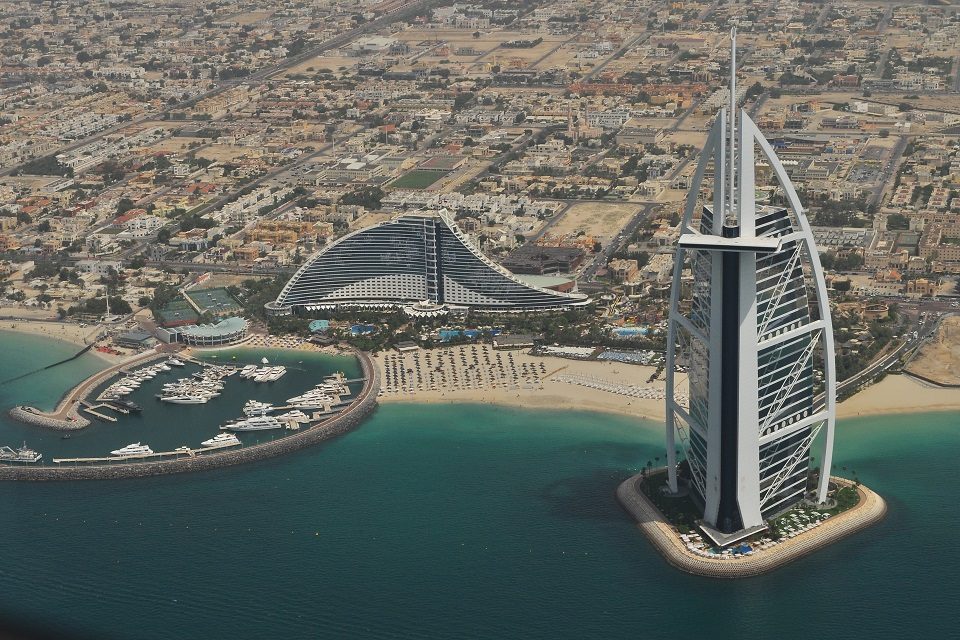Dubai: The World’s First Blockchain Government

Over the last half century, Dubai has transformed itself from a small desert city to a sprawling metropolis of 2.7 million people. The government has truly leapfrogged on the back of technology.
Indeed, Dubai has caught tech fever in a serious way. Earlier this year, the city announced that it will be flying automated taxis, and recently, Dubai even unveiled its own robocop prototype. While these pieces of our sci-fi dreams are finally becoming a reality, it is clear that, for Dubai, the city is moving according to plan.
With its tremendous growth and daunting logistical challenges, Dubai has had to be innovative in importing its water, managing healthcare, education, housing and even in building its renowned skyscrapers to prevent them from sinking into the soft sand or being damaged by harsh winds. In doing so, the emirate has become a globally competitive city, attracting an incredibly skilled foreign force from across the globe.
Oil rich history
Both Dubai’s economic success and infrastructure tech success, however, can be traced back to its tremendous oil reserves. Containing the bulk of the world’s oil, the Arab Gulf is not an easy place to drill.
Following in Abu Dhabi’s footsteps, Dubai discovered oil in 1966 after years of exploration. The country relied on what was then advanced technology to access its reserves, and the resounding success of its oil endeavors led to tremendous wealth for the emirate. Reliance on oil, however, has led to its own challenges.
Seeing that its reserves were not finite while acknowledging the looming issue of global warming, Dubai has reduced its dependence on oil significantly. Oil accounted for 24% of the country’s GDP in 1990, and the UAE now plans to commit to 0% of its GDP in the near future. This massive transformation has been fueled by its technology initiatives.
In 1999, Dubai launched its ICT strategy which led to the development of Dubai Internet City. DIC is a free economic zone within the city which has provided tax and customs incentives to draw tech giants from across the globe, creating a hub for tech-minded startups. Dubai’s Internet City was such an economic success that the country also launched Dubai Media City and Dubai Science city, separate economic zones focusing on their namesakes.
In keeping to its commitment to technology, Sheikh Mohammed bin Rashid Al Maktoum launched the Dubai Smart City initiative in 2013. In a collaborative approach between the public and private sectors, the city has embarked on a number of projects focusing on increasing happiness, growth, and functionality.
With the city already boasting over 1000 e-services from securing licenses, paying fines, signing contacts and more, Dubai is already well on its way to realizing its Smart potential.
More recently, the emirate has rolled out smart traffic lights using the Internet of Things, increasingly widespread internet connectivity, a blockchain-based real estate sector, and more. Its most ambitious projects, however, are still in development.
Pivoting to blockchain
In realizing its Smart City dreams, Dubai hopes create a platform which will connect its citizens to public transportation, reduce energy consumption, create online libraries and resources for students, and allow businesses to share resources. Additionally, Dubai is looking to integrate its whole government using blockchain technology to increase efficiency, transparency, and transform its economy.
“We want to make Dubai the first blockchain-powered government in the world by 2020,” Aisha Bin Bishr, director general of Smart Dubai, noted.
This blockchain strategy has led to the creation of emCash, the emirates’ first state-sponsored cryptocurrency.
Ali Ibrahim, Deputy Director of Dubai Economy announced in a press statement: “Founded on the latest block chain technology, emCash will be the digital currency in emPay wallet, launched by Emcredit to support contactless payments. emPay allows UAE residents to make varied payments, from their daily coffee and children’s school fee to utility charges and money transfers, through the near field communication (NFC) option in their phones. With emCash, emPay users will have the option of a secure digital currency, and merchants receive such payments in real time without going through intermediaries.”
EmCash will act as a seamless payment method for everyday payments, reducing settlement times, costs, and increasing flexibility and security.
With the introduction of its own encrypted digital currency using blockchain, Dubai is making tremendous progress in its Smart City initiative. While there is still 3.5 years of waiting until these goals are fully realized, Dubai’s experiments in the fintech realm will surely act as a model for other cities looking to take advantage of these emerging technologies.
Featured image from Roman Logov on Unsplas
Hi! I am a robot. I just upvoted you! I found similar content that readers might be interested in:
https://cryptoinsider.com/content/dubai-worlds-first-blockchain-government/index.html
World First Blockchain is dubai Wow How to become rich in dubai